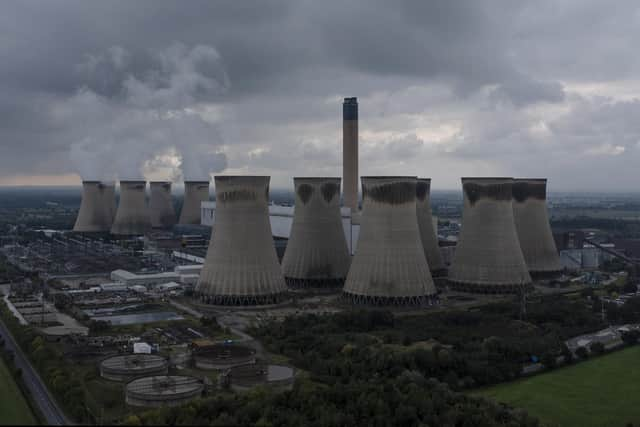Why has Grant Shapps rejected Drax’s £2bn carbon capture scheme? - Jayne Dowle
At the same time, Shapps said that this ambition would, “level up our country and make it fairer for all”.
At the heart of it all was “growth”, he added, for good measure.
Advertisement
Hide AdAdvertisement
Hide AdMany connected with the Drax carbon capture project at Selby in North Yorkshire may well be asking today, “what growth?” and “what levelling up?”


For we learn that Drax, the biggest power station in the UK, and in our own region, has been knocked back for fast-track funding for its proposed £2bn carbon capture plant, whilst Teesside has been favoured.
Regional leaders are - excuse the pun - fuming, arguing that the decision makes a mockery of several things at once, levelling up, investment in new technologies to create ‘clean energy, energy security and securing the UK’s place in the thrusting global economy.
“While we’re pleased that a number of Teesside projects have been selected for Track-1 status, we’re at a loss to see why the Humber has been missed out entirely,” says Henri Murison, chief executive of the Northern Powerhouse Project. “It means we’ll lose out on £15bn in private investment - £2bn from Drax alone - not to mention thousands of high-quality jobs.”
Advertisement
Hide AdAdvertisement
Hide AdIt's not a decision that’s going to go down well with ‘Red Wall’ Tories in Yorkshire and Humber seats either, especially as the General Election is looming.
Nigel Adams has been Conservative MP for Selby since 2010, and says that the decision would come as a “surprise to many” and a blow to Drax employees in Yorkshire.
The plan, to fit emissions-trapping technology to the biomass plant - coal was phased out in March 2021 - was not selected by the Government as a “track 1” winner to be accelerated by Shapps’ department for development by 2027. Neither was any other Humberside project.
Instead, eight other projects, including a carbon capture facility on Teesside, have been fast-tracked. It had been planned that emissions from the Drax project were to feed into a saline aquifer in the North Sea that will store emissions from both Teesside and the Humber, both significant emitters of carbon due to their industrial activities.
Advertisement
Hide AdAdvertisement
Hide AdHowever, now that only projects on Teesside have been fast-tracked, industry sources say that this suggests pipeline infrastructure will be built there first.
The future of Drax then hangs in the balance. As the country’s biggest power station, powering four million homes by burning biomass wood pellets, its position is – to non-energy industry observers – surprisingly precarious.
The site already receives hundreds of millions of pounds in renewable energy subsidies each year. It’s reported that these subsidies are due to run out in 2027. One of the reasons, it’s said, that Drax had been pushing for fast-track status for its new carbon capture units was to secure its operation in four years’ time, with a new subsidised income stream.
There have been rumblings, including a recent column by journalist Dominic Lawson, son of former Conservative Chancellor Nigel Lawson, about just why Drax appears to have received so many government subsidies already. Writing in a Sunday newspaper in February, Lawson went as far as to call Drax the ‘darling of the government’ as ministers seek to make the UK net zero by 2050.
Advertisement
Hide AdAdvertisement
Hide AdThat was in February. So what’s changed? The wider political picture, perhaps? Murison says the decision raises serious concerns about whether the government is playing political games – “divide and rule, instead of doing what is right for the economy and the path to decarbonisation.”
Drax bosses have already warned that the power station may otherwise not be viable, threatening energy security. Of course, as we all know after enduring this last winter, energy security is vital if our country is to keep functioning. Whilst we avoided the threatened power cuts, our reliance on overseas energy sources is extremely worrying. Surely the Government should not be sidelining the biggest power station in the country when this is the case.
It seems desperately unfair to leave Drax out in the cold when every week we hear yet more warnings about how our energy bills will rise whilst we are hooked into overseas energy networks.